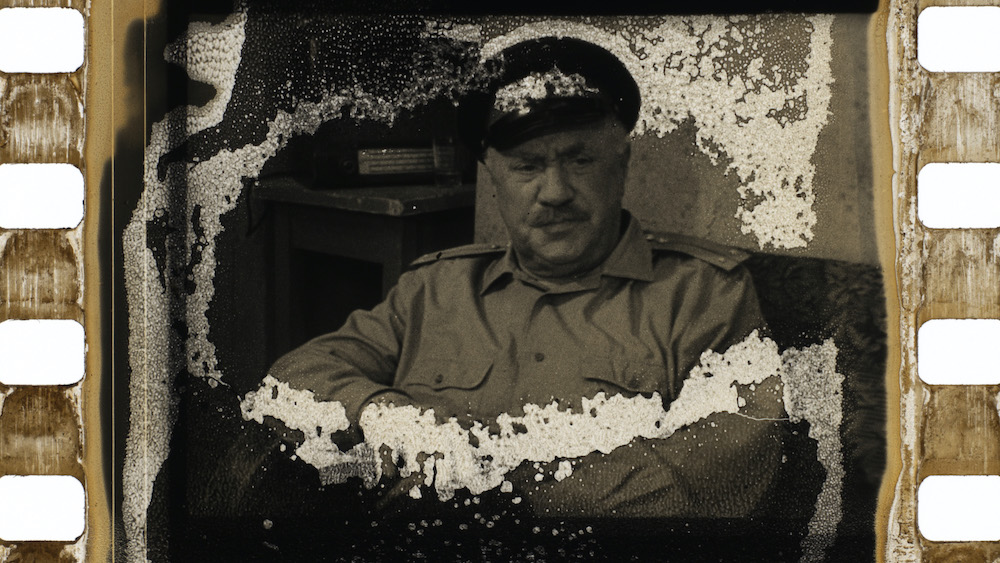THE VILLAGE DETECTIVE: A SONG CYCLE

(Jonathan Marlow provides this great film review of The Village Detective: A Song Cycle, Bill Morrison’s stirring new meditation on cinema’s past which opened in New York on Wednesday, September 22. Like what you see here on Hammer to Nail? Why not give just $1.00 per month via Patreon to help keep us going?)
Five years ago, off the coast of Iceland, a fisherman pulled in his nets and discovered an oddity amongst the usual catch: four reels of 35mm film! Initially, as with any such opportune recovery, the hope was that this was the lone print of some long-lost masterwork. No such luck.
Composer Jóhann Jóhannson (devastatingly, R.I.P. shortly thereafter) wrote to filmmaker Bill Morrison around this time with news of the mysterious haul. The two had previously collaborated on The Miners’ Hymns (2010) and this discovery of potentially deteriorating footage seemed right up Morrison’s proverbial alley. However, when the reels were examined by an archivist, it was determined that this 35mm material was merely a crumbling dupe of a fairly common Soviet-era caper-comedy, Derevenski detektiv (Village Detective) (1969). Nothing unique about it outside of the curious tale of its previously submerged whereabouts. How did it arrive at the bottom of the sea? Perhaps tossed off of the deck of a cruise ship at some point in the 1970s. Then again, perhaps not.
In theory, that would otherwise be the end of the story. Morrison, however, took this starting-point as an ideal opportunity for an essay-film about Soviet cinema in general and, specifically, the picture’s star — the great Mikhail Zharov — known largely by Russians of an advanced age (and those with a more-than-casual awareness of former-U.S.S.R. filmmaking, this writer included). Zharov would be notable alone for his appearances in Vsevolod Pudovkin’s Shakhmatnaya goryachka (Chess Fever) (1925) and both parts of Sergei Eisenstein’s Ivan grozny (Ivan the Terrible) (1944 and 1958, respectively), starring as a notable guard of the Tsar (and a stunning score by Sergei Prokofiev). If you’re somewhat familiar with these brilliant films, you’d undoubtedly recognize his memorable visage.
The realm of the archival-footage-driven essay-film covers the vast spectrum of media-masters such as Mark Rappaport and Craig Baldwin or even Lawrence Jordan and Stacey Steers, all geniuses at taking pre-existing imagery and assembling those assorted elements all together to make a tapestry much richer in its recombination. Morrison’s route tends toward the materiality of decrepitude yet there is an undeniable beauty to deterioration no matter how many times those blotches roll past the gate. The Village Detective: A Song Cycle uses the submerged Derevenski detektiv as a cypher for a larger story (and it was a privilege to see it screened at Telluride, arguably the greatest film festival in the Americas, while the filmmaker sat across from me). [Admittedly, the absolute pinnacle of this form of archival-essay film is the legendary duo, Angela Ricci Lucchi [also, sadly, relatively recently R.I.P.] and Yervant Gianikian. If you haven’t had the extreme pleasure of experiencing their extraordinary works, seek them out immediately if you’re able locate them. Meanwhile, I digress…]
Derevenski detektiv (Village Detective) in its original form was adapted from an identically-named book about a rural policeman name Aniskin. The story concerns the theft of an accordion and how the value of that instrument in such a small village develops into a major incident. Ultimately, the detective makes his suspicions known and the whole thing is resolved rather tidily. The original was celebrated enough, in fact, that Zharov later directed-and-starred in two made-for-television sequels over the following decade, one with the alluring title Aniskin i Fantomas whereby the titular detective seemingly takes on the fabled master-criminal himself! Or that titling might be a bit of a ruse.
Not much of this is readily apparent in the transfers of these four deteriorating reels, set to an apt accordion score by David Lang — Morisson is persistently an ideal selector of musical collaborators — combined with a “clean” dialogue track lifted from a more-or-less pristine copy of the film and then subtitled (for the benefit of non-Russian-fluent viewers) while paired with these images awash in artifacts from its waterlogged past.
If you’re unfamiliar, Morrison’s work generally goes that way, back to his short Night Highway (1990) and the subsequent Decasia (2001), the latter in collaboration with composer Michael Gordon and, notably, the first contemporary film to be added to the National Film Registry. [Or, from an entirely different angle, you might recognize the filmmaker in Andrew Bujalski’s Mutual Appreciation (2005), a rare moment on the other side of the camera.]
In theory, this reconstruction should collapse under the evident weight of its disconnected elements. It has all of the trappings of a completely meandering exploration of disparate details and it all might seem to be a rather thin framework with which to hang this particular sort of quasi-documentary. Yet The Village Detective remains fascinating throughout, punctuated with musical interludes as the “song cycle” of the title suggests. Thirty years along in his peculiarly individualistic form of filmmaking, Bill Morrison continues to find fascinating avenues to explore our collective history through the essentially ephemeral nature of the moving-image. As he has exquisitely done with celluloid, others will follow with deteriorating digital images. [Seemingly, those efforts will then be affectionately referred to as “Morrison-esque” (thus arriving at the inevitable and appropriate “adjectivication” of a visually-identifiable style).]
– Jonathan Marlow (@aliasMarlow)
Kino Lorber; Bill Morrison; The Village Detective: A Song Cycle film review











